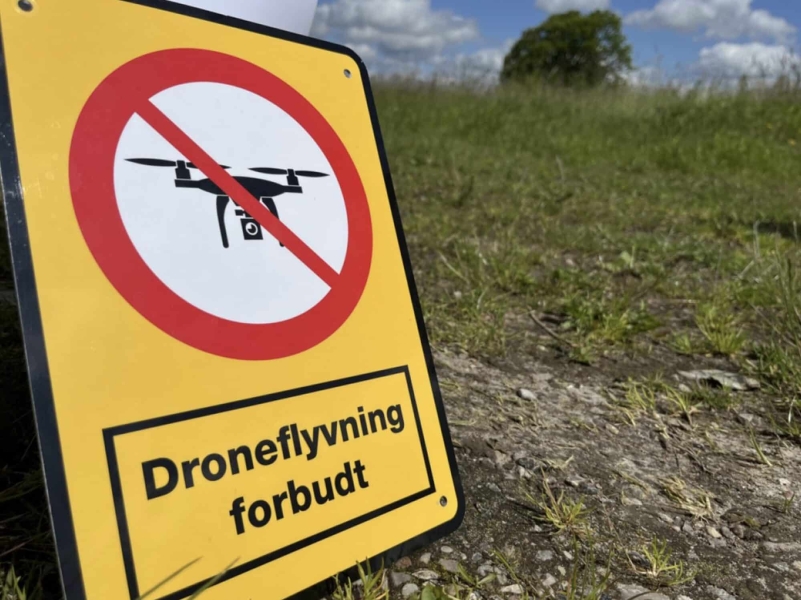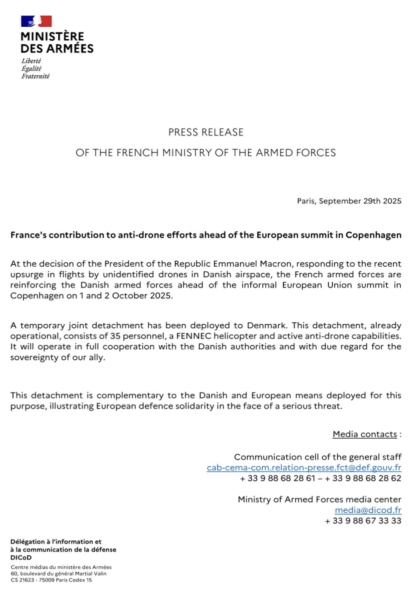France, Sweden Deploy Anti-Drone Units To Secure EU Summit In Denmark

France and Sweden have dispatched military anti-drone units to Denmark this week to protect an informal European Union summit in Copenhagen, responding to recent unexplained drone flights over Danish airports and military installations, Defense News reports. The deployment underscores growing concerns about hostile drone activity in European airspace and demonstrates how counter-UAS capabilities have become essential to protecting critical events and infrastructure.
READ MORE: Denmark Bans Civilian Drones Ahead of EU Summit Amid Security Concerns
Multi-nation Counter-Drone Response
France deployed a team of 35 personnel equipped with a Fennec light helicopter and “active anti-drone capabilities,” according to the French Armed Forces Ministry. The unit became operational Monday following authorization from President Emmanuel Macron and is working directly with Danish authorities. Sweden is sending its own military unit with anti-drone systems, along with radar capabilities to expand threat detection coverage across the Copenhagen area, Prime Minister Ulf Kristersson announced. The Swedish equipment was mobilized over the weekend specifically to counter “unwelcome drone visits” and potential attacks during the summit. Germany has also contributed anti-drone equipment to the security effort, while the German frigate Hamburg docked in Copenhagen to support surveillance operations under NATO’s Baltic Sentry mission.
Unknown Drone Activity Sparks Security Concern
Denmark observed multiple instances of unexplained drone activity at airports and military sites in recent days. While the operators remain unidentified, NATO Secretary General Mark Rutte stated last week that Russian involvement cannot be ruled out. “We are not naive,” Kristersson said, though Sweden currently has no direct intelligence linking the flights to Russia. Swedish Foreign Minister Maria Malmer Stenergard connected the incidents to Russia’s war against Ukraine and broader European security threats. With 44 European prime ministers attending the Copenhagen summit, Denmark took the cancellation risk “very seriously,” according to Kristersson.

Denmark’s Air Defense Gap
The heightened security measures highlight a critical vulnerability: Denmark currently lacks ground-based missile defense systems after decommissioning its Hawk missile units two decades ago. The country has been urgently acquiring air defense systems from three suppliers to establish initial defensive capabilities. EU Commissioner for Defense and Space Andrius Kubilius said Friday that European plans for a “drone wall” to protect the bloc’s Eastern border have progressed from discussions to concrete implementation.
DroneXL’s Take
This multi-nation counter-drone deployment reveals how seriously European governments now view the UAS threat landscape. The fact that three countries rushed specialized equipment and personnel to Denmark within days demonstrates both the perceived risk level and the sophistication required for effective counter-drone operations in complex urban environments.
What’s particularly striking is Denmark’s 20-year gap in air defense capabilities—a vulnerability that hostile actors clearly understand can be exploited with relatively inexpensive drone technology. The broader question is whether these reactive, event-specific deployments can scale into the persistent “drone wall” defense system the EU envisions for its Eastern frontier.
As drone technology becomes more accessible and adversaries grow bolder, will we see permanent counter-UAS installations at major European capitals and infrastructure sites, or will this remain a whack-a-mole response to emerging threats?
What’s your take on Europe’s counter-drone posture? Share your thoughts in the comments below.

